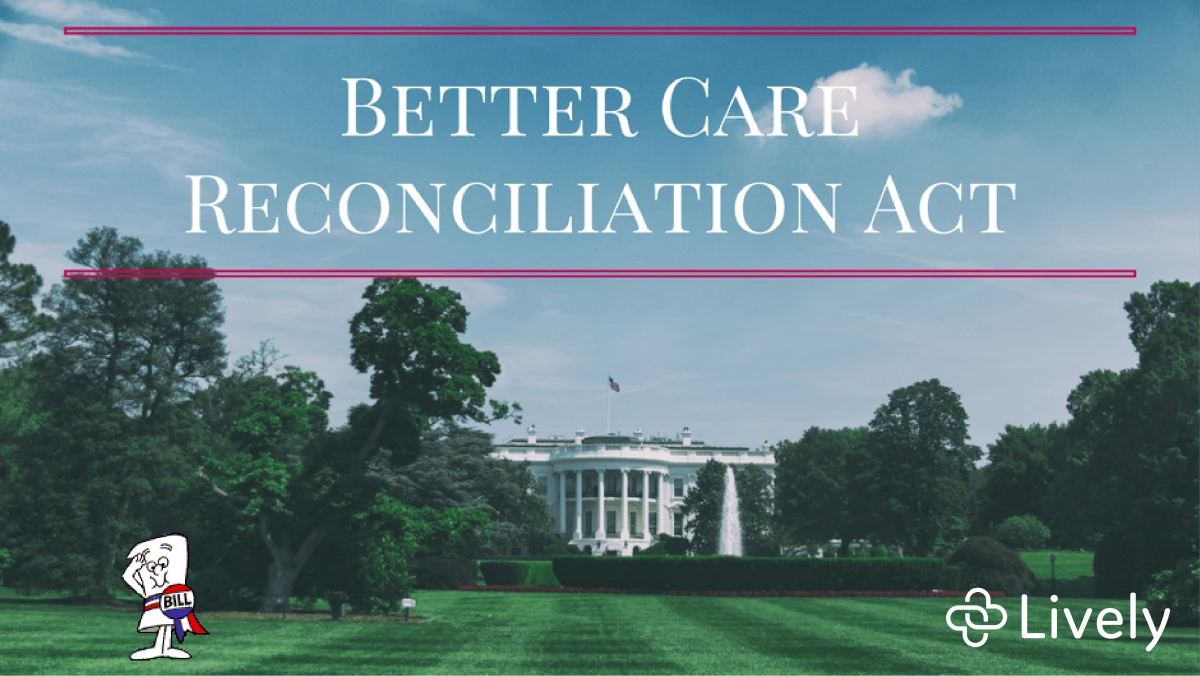The Lively Blog
SIGN UP FOR OUR
Newsletter
Stay up to date on the latest news delivered straight to your inbox
Better Care Reconciliation Act: What You Need to Know
Lively · June 23, 2017 · 4 min read

The US Senate released the full details of the 2017 Better Care Reconciliation Act that they have been working on, in private, for the last few weeks. This bill is in response to House Bill, H.R.1628 – American Health Care Act of 2017, that passed the House on May 4, 2017. There are key changes to both the House bill and Obamacare (The Affordable Care Act). Let us break it down for you.
It’s important to note the Better Care Reconciliation Act bill will go through markup, and revisions as part of the voting process. Let us show you the details so you can get a good handle on the changes and start planning for your healthcare future today.
Better Care Reconciliation Act: What got Repealed?
Individual health insurance – is no longer a requirement (nor will it include tax penalties) with the Better Care Reconciliation Act. This will allow American’s (who choose to) to opt out of health insurance.
Employment insurance – Larger employers are no longer required to offer health insurance. Individuals will still be able to get health insurance through state healthcare exchanges.
Out-of-Pocket Subsidies – These provided healthcare cost subsidies (for things like deductibles) for low-income Americans. These would be removed, in full, after 2019.
Obamacare Taxes – Tax credits for middle-income Americans, to offset health premiums, will be reduced.
Planned Parenthood – will not be federally funded for one year. There will also be restrictions on subsidies for abortions not involving rape, incest, or saving the mother’s life.
Better Care Reconciliation Act: What Changed?
Medicaid (expansion) – Federal funding will continue for states that expanded the program (31) through 2023. There is a reduction in federal funding starting in 2021 with the Better Care Reconciliation Act and sharp change in 2024, which would likely stop state expansion.
Tax Credits (for premiums) – removes investment income and wage taxes (above $200,000) under Obamacare to help pay for premiums.
Charging based on Age – Insurers will now have the ability to charge premium prices based on age. Expect healthcare premium prices to rise for older Americans.
Health Savings Accounts (HSA) – These have been a quiet darling of this process. HSA contributions limits are expected to double. Qualified expenses will expand to include over-the-counter medications. Both spouses will be able to make catch-up contributions starting in 2018 (to the same account).
Better Care Reconciliation Act: What is the Same?
Dependent care (until 26 years of age) – This is great news for children of parents that have health insurance plans. Enjoy it while you can kids!
Preexisting conditions – This is positive for any American’s with chronic diseases or major medical issues. It was a key piece of the Obamacare bill and will continue with the Better Care Reconciliation Act. However, states will have a waiver option to limit or change the standards as to what is offered. This nuance will be important to monitor. What remains to be seen is how to stop the expected death spiral, when healthy individuals are removed from healthcare exchanges and the pool of applicants is mostly highly billable patients.
How to Think About Healthcare for 2018
No matter where the Better Care Reconciliation Act ends up, it’s safe to assume trends of recent years that include higher premiums with lower benefits coverage will continue. These costs are affecting both employers and individuals. We expect this is a contributing factor to the 20% increase in HDHP over the last two years, which now accounts for 29% of all healthcare plans in the US. At Lively, we believe finding tools (like HSAs) to add to your healthcare arsenal are going to be key to mitigate costs and keep your financial health risk tolerable.

Benefits
2025 and 2026 Maximum HSA Contribution Limits
Lively · June 20, 2025 · 3 min read
On May 1, 2025, the IRS announced the HSA contribution limits for 2026: $4,400 for individual coverage and $8,750 for family coverage. That’s a $100–$200 increase from the 2025 limits, which are $4,300 and $8,550 respectively. If you’re 55 or older, you can still contribute an extra $1,000.

Benefits
What is the Difference Between a Flexible Spending Account and a Health Savings Account?
Lauren Hargrave · February 9, 2024 · 12 min read
A Health Savings Account (HSA) and Healthcare Flexible Spending Account (FSA) provide up to 30% savings on out-of-pocket healthcare expenses. That’s good news. Except you can’t contribute to an HSA and Healthcare FSA at the same time. So what if your employer offers both benefits? How do you choose which account type is best for you? Let’s explore the advantages of each to help you decide which wins in HSA vs FSA.

Health Savings Accounts
Ways Health Savings Account Matching Benefits Employers
Lauren Hargrave · October 13, 2023 · 7 min read
Employers need employees to adopt and engage with their benefits and one way to encourage employees to adopt and contribute to (i.e. engage with) an HSA, is for employers to match employees’ contributions.
SIGN UP FOR OUR
Newsletter
Stay up to date on the latest news delivered straight to your inbox
